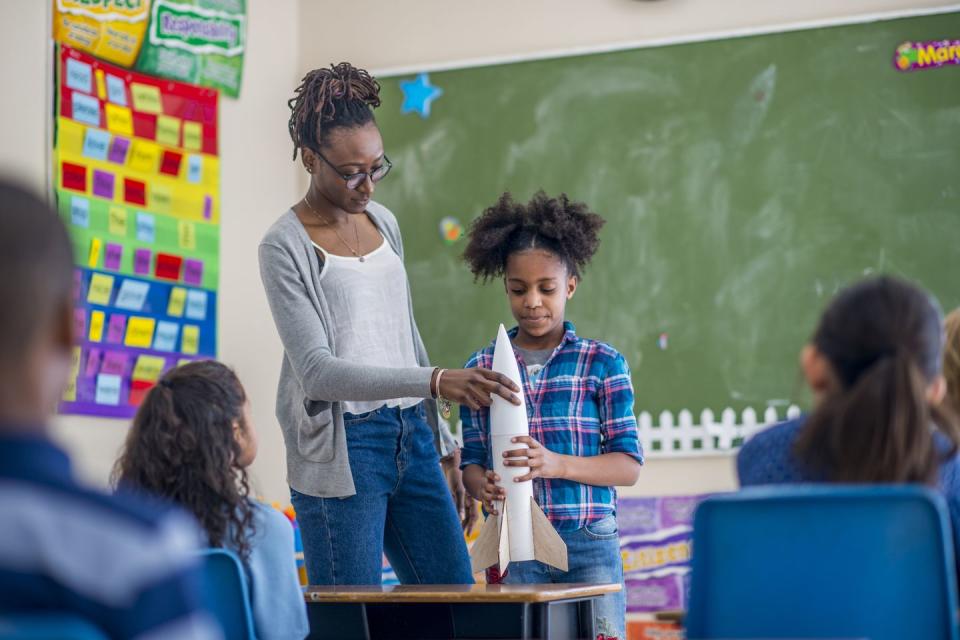The Crucial Reason Why Girls Need More Mentors In STEM

Mentors inspire us with their accomplishments and encourage us to dream bigger than we ever thought possible. But when you look at the most famous (men)torships of all time, something seems a bit… off.
Think about it. There’s Yoda and Luke Skywalker, Professor Dumbledore and Harry Potter, Genie and Aladdin, Gandalf and Frodo, Mr. Miyagi and the Karate Kid… and the list goes on. Where are the women? (And why are we still having to ask that question…)
Female mentorships might be marginalized in film, but we can’t let that happen in real life—especially when it comes to the STEM fields (that's science, technology, engineering and mathematics). As the National Girls Collaborative Project points out, “Women make up half of the total U.S. college-educated workforce, but only 29% of the science and engineering workforce.”
The Benefits of Mentorship
Even with inspirational females in STEM making the news—take Mayim Bialik, who is both a neuroscientist and an actress, and Dr. Jedidah Isler, who was the first African-American woman to earn a PhD in astrophysics from Yale, for example—underrepresentation is still a serious concern. It’s important that girls don't view STEM subjects as "men's fields" where they don’t belong, and mentorship plays a powerful role in changing that narrative.
If girls are exposed to strong, female STEM role models, a career in these fields will seem as attractive and attainable as any other. Mentorship can also increase self confidence, boost communication skills, and enhance leadership qualities that'll benefit girls throughout their careers.

Advocating for Girls in STEM
As a child, there’s nothing more exciting than making a volcano erupt in science class or engineering a masterpiece out of Play-Doh. But as kids get older and activities are replaced by textbooks, STEM subjects might not seem quite as thrilling—but that doesn’t fully explain the disparity.
Amy Blankson, a thought leader and researcher on happiness and technology, says the troubling shift is due to classroom dynamics. “Research shows that girls start doubting their STEM intelligence by age 6 and continue to lose confidence as classes become less gender-balanced and more intimidating,” she says.
Whatever the cause, it’s clear that parents and allies must work together to show girls that no subject is off-limits simply because of their gender.
Here’s how you can help:
Share your expertise. If you’re in STEM, offer to speak at elementary schools in your area, tutor children, or become a mentor.
STEM starts at home. Whether you have kids, babysit, or you’re spending time with nieces and nephews, incorporating more STEM activities into everyday life at home can ignite kids’ passion for these subjects. Check out this list of 40 fun STEM activities.
Encourage kids to try new things. If girls are losing confidence in their abilities early on, encouraging them to take risks can help shift their perception of their capabilities. Trying new things and knowing it’s okay to fail will empower girls to pursue passions despite their initial abilities or a bad test score.
Counteract stereotypes and misconceptions. Don’t let offhand comments like, “boys are better at math than girls” slide past you unacknowledged. Girls need to know that they’re just as likely to excel at STEM subjects as boys—but it starts with catching these misconceptions before they turn into beliefs.
Read books that show both genders in powerful roles. Books like, "Iggy Peck Architect" by Andrea Beaty, "Lab Girl" by Hope Jahren, and "Shark Lady: The True Story of How Eugenie Clark Became the Ocean's Most Fearless Scientist" by Jess Keating, show girls (and boys) that with enough passion and dedication, anything is possible for anyone.
STEM Resources
Know a budding STEM superstar or want to find an organization where you can become a mentor or volunteer?
These resources will help you get involved:
FabFems connects girls with female STEM mentors to increase awareness and interest in science, technology, engineering, and mathematics. Know someone who’d make a killer STEM mentor? Have them sign up as a FabFems role model.
SciGirls Connect encourages educators to adopt new, research-based strategies to engage girls in STEM. With 176 partner organizations located in schools, museums, community organizations and universities, SciGirls Connect hosts clubs, camps, and after-school programs for girls across 35 states.
Women@NASA offers an out-of-this world program to inspire the next generation of scientists, engineers, and innovators through a virtual mentoring project. Offered to middle-schoolers, Women@NASA is looking to change the world through STEM.
Young Women in Bio is a nonprofit organization with 13 chapters across the U.S. and Canada. They partner with companies, universities, hospitals, and organizations to host engaging, educational, and motivational programs. They aspire to be the definitive resource for girls looking for successful careers in STEM.
uCodeGirl is a nonprofit organization with various age-appropriate enrichment programs and STEM mentorship initiatives. They make technology learning accessible, relevant, and fun for girls aged 12 to 18.
From nationwide programs to activities at home, there are plenty of ways to support (and advocate for) girls in STEM. So, let’s make it a priority to show girls that gender doesn’t dictate who they can become or what they can achieve.
After all, there may not be a "Harriette" Potter in the mainstream who girls can relate to, but through mentorship, young female wizards will feel just as confident and competent as their male STEM counterparts.
You Might Also Like


